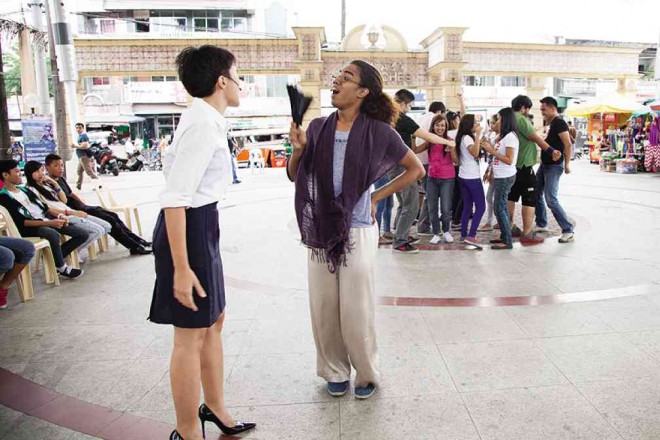
YOUNG ACTORS trained by the CCP’s Tanghalang Pilipino spread awareness about Aids in a street play titled “Melanie,” which depicts how a community reacts to a death caused by the disease. CONTRIBUTED PHOTO
When do theater players cease to be actors and be more than what they aspired for?
For veteran stage and television actor Fernando Josef, it is when one is able to step out of the physical confines of a stage and commit himself to the service of the greater community.
Josef, artistic director of Tanghalang Pilipino, the resident drama company of the Cultural Center of the Philippines (CCP), believes theater is a very potent educational tool: “It is not just about playing to sell out audiences or receiving accolades after a show, but being able to assume a higher responsibility—that of being an educator.”
Since late last year, Tanghalang Pilipino has toured communities in Metro Manila to present “Melanie,” a one-act play about a community’s reaction to a recent AIDS (acquired immune deficiency syndrome) fatality in their midst.
Tanghalan is supported by the United Nations Children’s Fund (Unicef) in a campaign strategy called “Theater for Development” (T4D), which promotes widespread awareness of HIV/AIDS among young people through theater. About a third of the Philippines’ new human immunodeficiency virus (HIV) infections now occur in the 15 to 24 year old age group. (See In the Know on this page.)
In preparation for the play, Tanghalang Pilipino’s seasoned actors had to undergo 18 workshop sessions covering such topics as theater for development, psychodrama for therapy and in-depth understanding of HIV and AIDS. The actors then developed the play. In observance of World AIDS Day in December last year, the group performed the play to a general audience in Pasay City.
The next phase of the project involved engaging young people themselves in community theater. The first stop was also Pasay where Tanghalang Pilipino’s home studio is based and, incidentally, where teenage pregnancy is on the rise.
‘Extra Knowledge’
Ana Marie Bacudio, project leader of Dagdag Dunong (Filipino for “extra knowledge”) and implementing partner for Pasay, says: “We helped identify young people eager to be involved in theater. For six days we trained them and they were able to write their own play. They then presented three performances: one before their parents and neighbors, another in an urban poor community, and a third at a university in Manila. Their performance, particularly at the university, was well
applauded.”
The Pasay acting trainees have since formed their own group. Calling themselves Teatro de Pasay, the young actors brought their play outside the city and to other community venues: Quezon City, Manila and Caloocan City. In every venue, they are supported by their mentors from Tanghalan. Mostly out-of-school youths, the Pasay performers now also enjoy the added opportunity of earning a modest allowance for each performance.
“Una pa lang po, hindi ko talaga ma-gets yung HIV (At first I was really clueless about HIV),” says 17-year-old Maiko Mercado in typical youth speak. “Then we were given the chance to get involved in this community theater project,” she adds. “I have been sharing information about HIV with my family since, and they really appreciate it. As to our current work, I am thrilled to be performing with professional actors from the CCP. Given the chance, I want to continue this advocacy.”
Bacudio says of her wards: “Performing side by side with their mentors inspires them to give their best. As they perform, their peers in the audience look up to them as role models. In the process, the audience learns about HIV.”
Kids, LGBTs in audience
Mercado and Bacudio’s enthusiasm is shared no less by Carmela Manuel, company manager of Tanghalang Pilipino. “We have presented the play in six barangays and the audience often varies. Sometimes we get kids who are more curious than the adults. The audience gathers as soon as they hear the sound system because they are curious to find out why we are there.
“The most memorable performance to me was in Sta. Mesa, where we had a combination of LGBTs (lesbian, gay, bisexual and transgender) and young people in the audience. At the open forum that followed the performance, one of them asked: ‘Where can we go for testing?’ We tell ourselves: Maybe we did have an impact. When somebody tells us that ‘finally after nine years I will get tested,’ it is heartening to realize that maybe we did something right.”
Reaching Yolanda-hit areas
In October 2014, T4D was also rolled out to areas affected by Supertyphoon “Yolanda” as part of Unicef’s response to the emergency, and to nearby Capiz and Iloilo provinces in March 2015, to bring key messages not only on HIV but on health and nutrition, child protection and other child rights concerns. Health workers and social workers who served as resource persons helped reinforce the key messages presented in the play.
To ensure sustainability of this effort, local government and Department of Education representatives were encouraged to host more performances in coordination with the artistic director of the local theater group or with Unicef.
A life skills training program for adolescents, which can further support and complement the forum theater, is also conducted by Unicef.